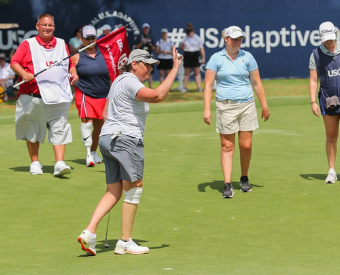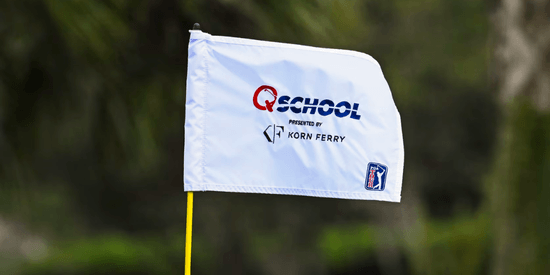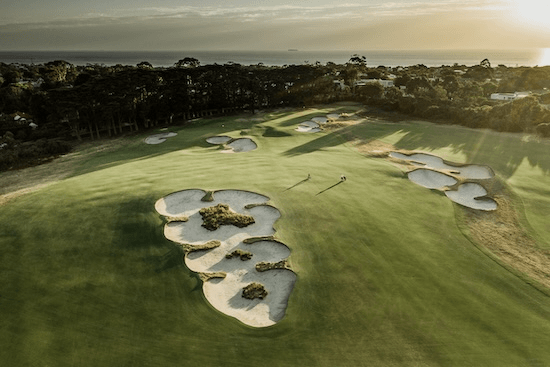Lee and Moore capture U.S. Adaptive Open titles at Pinehurst
7/20/2022 | by United States Golf Association
see also: View results for U.S. Adaptive Open Championship, Woodmont Country Club - South Course

Both golfers earn a place in golf history by winning the inaugural USGA national championship at Pinehurst Resort's Course No. 6
Simon Lee, 25, of the Republic of Korea, shot a final-round 71, then went birdie-par in a two-hole playoff on Wednesday to win the men’s overall title over Felix Norrman, while Kim Moore, 41, of Portage, Mich., went wire-to-wire to earn the title of women’s overall champion.
“It's pretty cool to be part of a little bit of history in golf,” said Moore, the women’s golf coach at Western Michigan University. “I’m thankful for my friends and family and their support and all the people back home that are wishing me good luck and have been watching. It's just been very humbling and exciting for me this whole week, and it's just been nothing but amazing.”

Kim Moore (Jeff Haynes/USGA)
In 2015, the Women’s Golf Coaches Association created the Kim Moore Spirit Award to recognize a student-athlete or coach who exemplifies a great spirit, mental toughness and a positive attitude toward the game, as well as being a role model to others. Throughout this week, Moore displayed those qualities in abundance as she displayed her on-course talents for the world to see.
“I think we're going to have a lot of rise in participation in adaptive golf,” said Moore. “I hope that's what this brings. I'm looking forward to seeing what happens.”
While the outcome of the women’s competition was not much in doubt, the battle for the men’s crown came down to the wire, and then some. Lee began the day with a two-stroke lead over Norrman, also 25, of Sweden. Both players have intellectual impairments – Lee was diagnosed with a form of autism that makes communicating particularly difficult, while Norrman has tyberios sclerosis, a rare genetic condition that impacts neurological pathways.
RELATED: These are some of the most inspiring swings in golf
Playing in the final group, Lee and Norrman birdied the par-5 opening hole. Lee followed with another birdie at No. 2 to extend his lead to three, and then things began to tighten. Lee bogeyed the par-4 third hole and, on the fifth, Norrman rolled in a birdie putt while Lee bogeyed. The two-shot swing resulted in a tie, and the players stayed close for the rest of the round. Twice on the back nine, Norrman moved ahead by one stroke, only to give the lead back with bogeys on the subsequent holes.
With a crowd encircling the 18th green, both Lee and Norrman saved par to force a two-hole aggregate playoff. In the playoff, Lee drained a 14-foot birdie putt on 17 to move ahead by one after Norrman missed an 18-footer for birdie. On 18, Lee stuck his approach shot inside 6 feet to keep up the pressure. While his birdie putt slid by, Lee tapped in for par to seal his victory and enjoyed a celebratory dousing of water from his inner circle.
“Today I played with my mind thinking, I can do it, I can do it, I can do it,” said Lee, who let out a series of celebratory howls when friends doused him with water after he sank the clinching putt. “I had a great time with the other players. The weather was very hot, but at least I got cool with the water on me.”
“I think this is the best I've played in a few years now,” said Norrman after his round. “It was really nice to play with Simon. He's a really good player.”
First-round men’s division leader Chad Pfeifer of Caldwell, Idaho, who played in the final group with Lee, Norrman, and Jack Bonifant of Kensington, Md., fired the round of the championship, a 4-under 68, to finish alone in third place at even-par 216.
More than the finishing scores, this championship will long be remembered as the first chapter in what has the potential to grow into one of the USGA’s most impactful events.
The U.S. Adaptive Open will return to Pinehurst Resort’s Course No. 6 in 2023, from July 17-19.
NotableIt brings me great joy to watch these incredible athletes play in the @usga Adaptive Open. Each and every one of these contestants is my hero. It is inspiring the way they play for the LOVE of the game. This is what the game of golf is all about .
— fredcouplesgolf (@fredcouplesgolf) July 20, 2022
In addition to the overall men’s and women’s champions, the winner of each of the eight impairment categories receives a copper medal for their accomplishments. Category winners on the men’s side were: Conor Stone (arm impairment); Simon Lee and Felix Norrman (tie, intellectual impairment); Chad Pfeifer (leg impairment); Jordan Thomas (multiple limb amputee); Kipp Popert (neurological impairment); Dennis Walters (seated player); Kurtis Barkley (short stature); Kiefer Jones (vision impairment).
The following women were category winners: Cathy Walch (arm impairment); Grace Anne Braxton (intellectual impairment); Kim Moore (leg impairment); Cindy Lawrence (multiple limb amputee); Ryanne Jackson (neurological impairment); Annie Hayes (seated player); Amanda Cunha (vision impairment).
Cedric Lescut, of Belgium, shot a 75 in Round 3 to improve by a whopping 19 strokes over his second-round score. Yet that on-course success might not go down as the highlight of the week for the 40-year-old with a prosthetic right leg. Lescut runs a foundation in Belgium called Android 34 that raises money to buy prosthetic limbs for children. By virtue of Lescut’s appearance in the U.S. Adaptive Open, he reported that donations have been pouring in. A local mother brought her 8-year-old daughter to the championship and they followed Lescut’s group for a few holes. Lescut chatted with them after the round, and the lucky youngster will soon receive a new prosthetic leg from his foundation.
Grace Anne Braxton, 50, of Fredericksburg, Va., had the honor of hitting the first shot of the championship on Monday morning. On Wednesday, she played in the final group with Moore, and afterward she reflected on the experience. “I had a great time. I enjoyed playing with Kim – it was one of the best things for me because it showed me that I can play with a pro like her, no matter what my disability is.”
Mike Bailey served on the USGA Executive Committee for many years and has worked dozens of USGA championships. This week, he was the official starter on Hole 1, announcing the names of all 96 players when they started their round there. When asked to put this experience into context, he didn’t hesitate. “It is by far the most inspirational three days I’ve had at any USGA championship. What really made it unique was that you could really feel that it was a championship. Yes, the players are athletes with disabilities, but they are athletes first, and they proved it.”
by Greg Midland, USGA
About the U.S. Adaptive Open Championship
Inroduced in 2022, the U.S. Adaptive Open Championship is a 54-hole stroke play championship open to males and females, professionals and amateurs, with either physical impairment, sensory impairment (vision), or intellectual impairment, who have a W...
Most Popular Articles

2025 PGA TOUR Q-School Guide: Sites, Scores, and Who Advanced
Dec 5, 2025Second Stage is complete and Final Stage awaits at Sawgrass — follow every Q-School leaderboard and the players still chasing
2025 LPGA TOUR Q-Series: Final Qualifying Stage FINAL SCORING
Dec 8, 2025Helen Briem earns medalist honors, 31 players headed to the LPGA next year
2025 PGA TOUR Q-School Final Stage: Ewart Leads Five New TOUR Card Winners
Dec 14, 2025A.J. Ewart topped Final Stage at TPC Sawgrass, leading five players who secured PGA TOUR membership for 2026.
Australian Open at Royal Melbourne: Preview, amateur bios, and how to watch
Nov 30, 2025Rory McIlroy headlines one of the championship's top fields in years - at least four amateurs will have their chance at gloryInside Gil Hanse’s Restoration of Baltusrol’s Upper Course: A Return to Tillinghast’s
Dec 11, 2025Renowned architect Gil Hanse reveals how he brought Baltusrol’s Upper Course back to life by honoring A.W. Tillinghast’s original